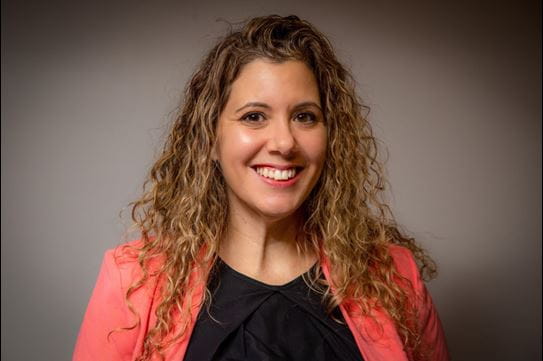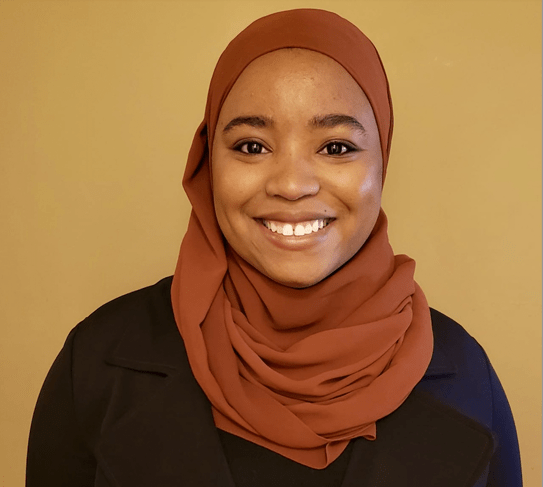Dr Andrea Covelli and her team of researchers are leading a study to interview Black women across Ontario, to identify barriers and inequalities in cancer care that could result in poorer care. They are an inspiration, as they give hope for more spaces for diverse Canadians to tell their stories.
Becoming impassioned to improve the equity of breast cancer care

When Dr Covelli was a junior surgical resident, she had many conversations with people who had recently been diagnosed with breast cancer, as she tried to help them navigate this challenging time.
“I remember being profoundly impacted by these experiences. There’s always that moment where the life they had before this diagnosis is never going to be the same. When I stepped out of my surgical training and did my PhD, I knew I wanted to focus on breast cancer.”
After completing her PhD on breast cancer and her surgical residency, Dr Covelli found that improving the equity of cancer care interested her the most.
Giving space to let Black women tell their stories
Once she considered how she can be a better ally to underrepresented populations, Dr Covelli wanted to give members of underrepresented populations the opportunity to share their experiences, as a way to investigate whether there are substantial inequalities in Canadian healthcare that need to be addressed.
We have data that shows there are disparities in care within the United States based on race, but we lack similar statistics in Canada. These aren’t reflected in socioeconomic or insurance status, so there’s some disparity in care that Black women in the United States receive. I have no reason to believe that this isn’t true in Canada.
To understand if overt racism or other factors play a role when Black women receiving cancer care, she and a team of researchers are conducting interviews with 70 Black Canadian women about the positive and negative experiences they have had when seeking healthcare services for breast cancer.
Recurring themes that arise from these interviews will inform conversations in national focus groups with representatives for patients and community organizers, like the Canadian Cancer Society, BC Cancer Agency and The Olive Branch of Hope.
Using these focus groups, they hope to develop new tools and policies that will improve cancer care for Black women across Canada.
Improving trust and letting Black women know they are seen and heard

One of the research coordinators who is conducting interviews for this study with Dr Covelli is Ielaf Khalil. She has found that Black women often felt that a lack of representation in the healthcare sector has resulted in them feeling a lack of empathy towards their concerns during conversations with physicians.
One thing that stands out to me is how much mistrust there is of healthcare providers, even when women have a positive experience. And I think this mistrust is the result of the history of anti-black racism and slavery that has existed on this continent. Women we’ve spoken to often try to find ways to get around this – such as relying on people who they trust within their families to either provide them with information or to help them better prepare for an upcoming appointment.
With these insights, Ielaf, Dr Covelli and Dr Aisha Lofters have created Every Breast Counts, a breast cancer digital resource that will feature videos created by Black doctors and new print materials that can be posted in cancer centres concerning the healing of Black skin after chemotherapy, as well as other topics related to health and recovery. Ielaf’s desire is that these resources will show that the pain experienced by Black women is being taken into consideration within the healthcare sector and will alleviate anxieties around someone’s next appointment with a doctor.
Acknowledging there is more work to be done
When she first decided to try to address the inequities in cancer care, Dr Covelli remembers that the societal impact from the death of George Floyd and similar news stories were motivating factors to want to focus on Black populations for this study.
“That was what finally gave me the impetus to take on the project where I often felt that I was an outsider and the wrong person to research in this area. In reflecting on how I saw myself as an ally, I thought ‘how do I use my skills to try and address the inequalities that I’m aware exist?’.”
Dr Covelli is working alongside doctors Aisha Lofters, Juliet Daniel, Gayanthri Naganathan, Frances Wright, Danielle Rodin, Tulin Cil and the executive director of The Olive Branch of Hope, Leila Springer. Although this work is focused on Black women in Canada, Dr Covelli says that other populations can benefit from similar studies - such as Indigenous populations, and new immigrants - in the hopes of creating greater equality for people in need of life-changing cancer care.
